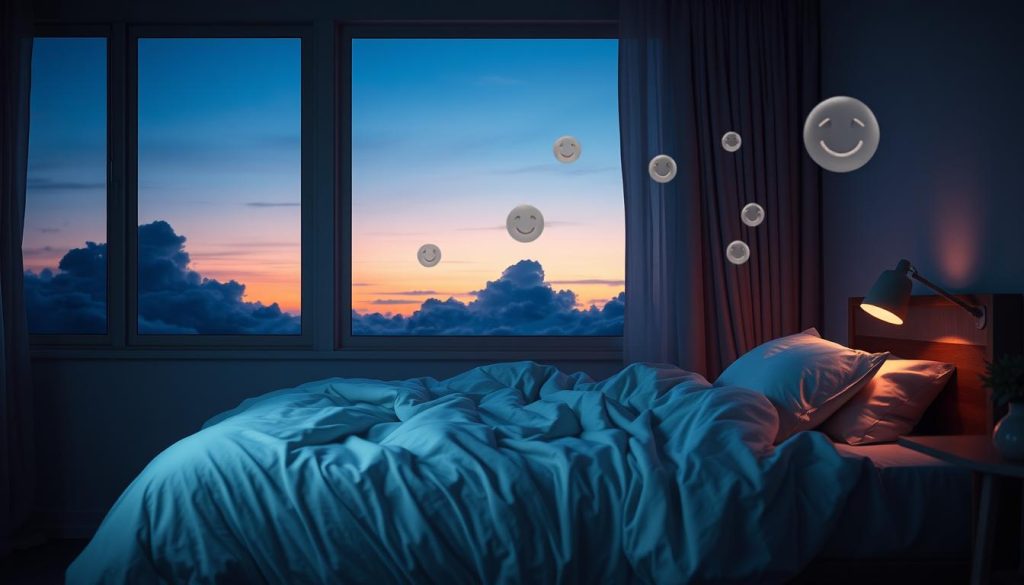Learning about the link between my circadian rhythm and mood is key to better emotional health. This internal clock controls my sleep and how I feel each day. By matching my habits with these rhythms, I can boost my mental health.
Let’s dive into how these connections shape my life. We’ll find ways to improve mood regulation together.
Understanding Circadian Rhythm
Exploring circadian rhythms science shows how our daily lives are governed. These biological processes run on a 24-hour cycle, influenced by light and temperature. The suprachiasmatic nucleus in our brain controls this cycle. If it’s off, our sleep and wake times can get mixed up, causing health problems.
The Science Behind Circadian Rhythms
Circadian rhythms science highlights their role in our body’s functions. They affect more than just sleep; they influence hormone release, eating, and body temperature. For example, studies show that rhythm disruptions can cause sleep disorders and mood swings. Knowing this helps me live in sync with my body’s natural rhythm, improving my health.
How Circadian Rhythms Influence My Daily Life
Understanding circadian rhythms helps me improve my work and personal life. By knowing when I’m most alert, I can plan my tasks better. This way, I can keep my energy high and emotions stable. Living in harmony with these rhythms makes each day more fulfilling.

The Connection Between Mood and Sleep Patterns
My mental well-being is closely tied to my sleep. Quality sleep helps me stay emotionally balanced. When I get enough sleep, I feel more stable and can handle daily stress better.
Studies show sleep deprivation can lead to anxiety and depression. This makes me understand how important good sleep habits are.
The Impact of Sleep on My Emotional Well-being
My sleep affects my mood a lot. Good sleep helps me face challenges better. But bad sleep makes me feel irritable and negative.
Millions of Americans struggle with mental health issues. Poor sleep can make anxiety worse and make it hard to control my mood.
How Sleep Disruptions Affect My Mood Regulation
Sleep disruptions can happen anytime, due to stress, noise, or a busy life. These disruptions mess with my mood and make me feel worse over time.
I’ve learned to find and fix the causes of these disruptions. This is key to staying emotionally balanced.
| Sleep Quality | Emotional Effects | Common Symptoms |
|---|---|---|
| Restful Sleep | Positive mood, emotional stability | Increased energy, focus |
| Moderate Disruptions | Irritability, mild anxiety | Fatigue, reduced concentration |
| Severe Sleep Deprivation | Heightened anxiety, clinical depression | Emotional outbursts, cognitive decline |

Circadian Rhythm and Mood Regulation
Learning about my circadian rhythm can really help with managing my emotions. It shows how my sleep affects my mood during the day. By checking myself, I can spot when my emotions change and find ways to handle them better.
Identifying My Circadian Rhythm Patterns
Keeping track of my sleep and mood helps me understand my circadian rhythm. Here are some ways to do it:
- Keep a sleep journal to note when I sleep and wake up, and any times I wake up at night.
- Write down how I feel every day, from when I wake up to different times later.
- Use sleep apps to see how well I sleep and learn about my circadian rhythm.
- Notice how my energy changes during the day to know when to work and when to rest.
By tracking this info over time, I can figure out my unique circadian rhythm. Knowing this helps me make choices that improve my mood.
| Method | Description | Benefits |
|---|---|---|
| Sleep Journal | A log where I record my sleep times and interruptions. | Helps identify sleep trends and patterns over time. |
| Mood Tracking | Daily notes on my emotional state at different times. | Enables correlation between mood and sleep cycles. |
| Sleep Monitoring Apps | Apps that track my sleep patterns with detailed analytics. | Offers personalized insights and recommendations. |
| Energy Level Observation | Assess energy levels throughout the day. | Assists in scheduling activities for peak efficiency. |

Practical Tips to Sync My Circadian Rhythm
To sync my circadian rhythm, I need a regular sleep schedule and natural light during the day. A good nighttime routine helps me feel better every day. Making small changes can improve my mood, alertness, and overall health.
Creating a Sleep Schedule That Works for Me
Having a set sleep schedule is key for a healthy circadian rhythm. I try to keep the same sleep and wake times, even on weekends. Here are some tips to help me:
- I pick a fixed bedtime for my nighttime routine, helping my body relax.
- Doing relaxing activities like reading or meditation tells my body it’s time to sleep.
- Staying away from caffeine and heavy meals before bed helps me sleep better.
- Keeping the same wake-up time keeps my internal clock in sync.
Using Natural Light to Regulate My Mood
Natural light is crucial for my mood and circadian rhythm. Sunlight affects melatonin, which controls my alertness and mood. By adjusting my daily routine, I use natural light to my advantage:
- I go outside in the morning for 20–30 minutes to set my internal clock.
- Opening curtains and blinds during the day brightens my space, boosting mood and productivity.
- I avoid unnatural light in the evening to get ready for sleep.
- Using light therapy lamps in winter keeps my mood stable and improves my well-being.
| Time | Activity | Benefit |
|---|---|---|
| 6:30 AM | Wake Up | Start the day with natural light exposure |
| 7:00 AM | Morning Walk | Boost mood and enhance alertness |
| 8:00 PM | Limit Screens | Prepare for better sleep quality |
| 9:30 PM | Wind Down | Signal readiness for sleep |
| 10:00 PM | Sleep | Reinforce circadian rhythm and improve mood regulation |
The Effects of Technology on Circadian Rhythms
Our growing use of electronic devices worries us about their health impact, especially on sleep. Too much screen time, especially at night, messes with our body clocks. The blue light from devices can stop our bodies from making melatonin, making it hard to sleep.
Limiting Screen Time for Better Sleep Quality
Controlling our screen time is key to better sleep. Here are some tips that work:
- Start winding down an hour before bed by avoiding screens.
- Set screen time limits in the evening for other relaxing activities.
- Use apps to track and limit social media or game use at night.
- Try offline hobbies like reading or journaling to get ready for sleep.
Understanding Blue Light and Its Impact on My Mood
Blue light’s effects aren’t just about sleep. It can also mess with our mood and feelings. Studies show that blue light at night can make us feel irritable or anxious. To fight these feelings, I do the following:
- Turn on blue light filters on my devices.
- Wear blue light-blocking glasses when using screens after dark.
- Lower the brightness of my screens in the evening to cut down on blue light.
Long-Term Implications of Circadian Misalignment
Living out of sync with my body’s internal clock can lead to serious health problems. Issues like obesity and diabetes can arise when my body’s rhythm is off. Studies show that not following a regular sleep schedule can mess with my metabolism and blood sugar levels.
This means my daily habits can affect my health over time. It’s crucial to understand how our routines impact our bodies.
Also, the emotional side of circadian misalignment is a big concern. Poor sleep can cause anxiety and depression. It’s not just about feeling tired the next day. It can lead to long-term emotional problems if not fixed.
So, taking care of my sleep is key for my mental health. By keeping a regular sleep schedule, I can avoid chronic health problems and stay mentally well. This knowledge helps me make better choices for a healthier, happier life.

